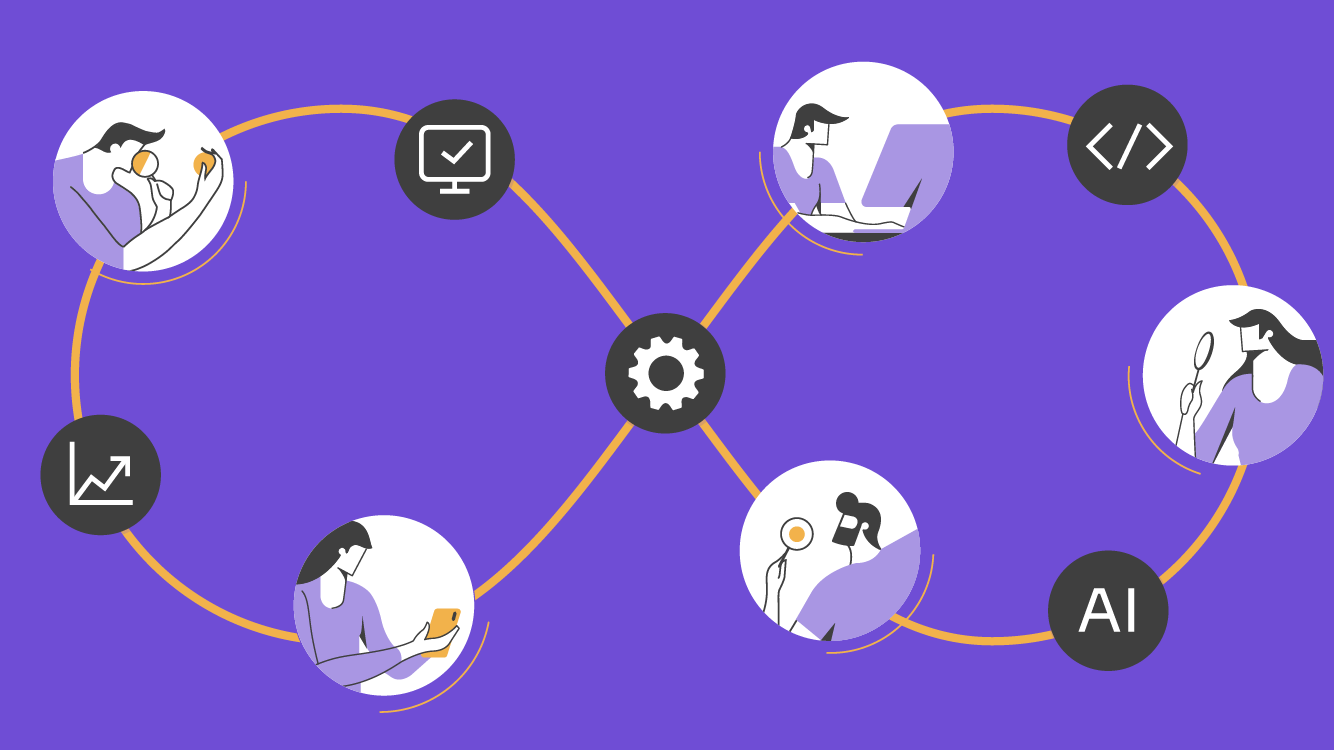What’s holding Canada’s health tech back from scaling? Explore how AI, regulation, and Abstracta Intelligence help health tech teams deliver trusted digital solutions.


Canada’s health tech sector is on the edge of something big—and ready to take the next leap.
With strong research institutions, a resilient public health system, and increasing investment in AI, the country is well-positioned to become a global leader in health tech innovation. But in 2025, having a promising prototype or a great idea is no longer enough.
Scaling meaningful impact—whether nationally or globally—requires more than innovation. It calls for operational excellence, interoperability, trust, and the ability to adapt fast.
Intelligent systems, supported by AI agents and designed for dynamic environments, offer a path to build this foundation and set Canadian companies apart in an increasingly demanding global market.
At Abstracta, we work side by side with health tech teams to turn complex challenges into scalable, intelligent solutions. We support teams in building solutions that are explainable, secure, and ready to scale across clinical, regulatory, and operational environments.
Ready to build the future of Healtech? Contact us!
Health Tech in Canada: Strong Roots, Growing Ambitions


Canada’s health tech ecosystem has made significant strides in recent years. Public-private partnerships, innovation hubs, and government-backed research have helped many companies bring forward new digital tools, from remote care platforms to AI-powered diagnostics.
Yet, innovation faces barriers: regulatory fragmentation across provinces, delayed interoperability, and a lack of clarity around privacy and AI governance. Bill C-27, which aimed to modernize data privacy and AI legislation, remains pending. This leaves healthcare providers navigating a patchwork of provincial standards while striving to maintain patient trust and enable data stewardship.
The ability to scale solutions across such a fragmented environment is a strategic advantage in itself, one that mirrors the challenges of expanding to international markets.
Companies that develop the capacity to operate under complexity at home are more likely to adapt well to diverse regulatory, clinical, and cultural settings abroad.
Why Intelligent Systems Are Essential for Scalable Innovation


Intelligent systems are not just about performance—they’re reshaping patient care experiences. By detecting patterns, adapting in real time, and reducing error rates, they directly contribute to better care and more reliable outcomes for patients and healthcare professionals alike.
As health tech solutions grow more sophisticated, so do the risks associated with failure. Systems must not only perform—they must be explainable, observable, and continuously improving.
AI agents play a key role in this evolution. Unlike basic automation, these agents bring awareness and decision-making capacity into the system. They monitor data flows, detect anomalies, correlate system events, and adapt to changes in real time.
This results in:
- Reduced manual effort and fewer errors
- Faster resolution of performance issues
- Better alignment with evolving standards
- Greater operational consistency across regions or deployments
When these capabilities are embedded early in the product lifecycle, they enable scalability without sacrificing trust, performance, or safety.
Comparing Basic Automation vs. AI Systems
Understanding the strengths and roles of both basic automation and AI systems is crucial when scaling complex solutions.
| Aspect | Basic Automation | AI Agents |
| Decision-making | Executes predefined tasks based on set rules. | Makes autonomous decisions using contextual awareness and real-time data. |
| Adaptability | Performs well in stable, repetitive environments. | Adjusts automatically to changes in data, system behavior, or external factors. |
| Anomaly Detection | Relies on static thresholds; unexpected events may go unnoticed. | Identifies patterns and anomalies proactively, often before they impact operations. |
| Observability | Offers visibility into known workflows and metrics. | Provides advanced system insights, correlating events, and continuously monitoring complex behaviors. |
| Scalability | Scales by replicating processes or extending rule sets. | Enables dynamic scalability by learning and evolving with system needs. |
| Human Involvement | Often requires manual oversight and maintenance. | Reduces manual effort by handling routine tasks and escalating only complex issues. |
| Fault Tolerance | Reacts to issues once they occur, often requiring manual intervention. | Anticipates and mitigates potential failures in advance. |
| Explainability | Limited traceability in decision-making. | Designed to support traceable decisions, aiding transparency and compliance. |
| Regulatory Alignment | Depends on scheduled audits and manual controls. | Can align with evolving regulations through built-in compliance monitoring. |
| Operational Consistency | May vary across teams or environments. | Delivers consistent performance across different deployments and regions. |
| Implementation Complexity | Quick to deploy and effective for well-defined tasks. | Requires upfront investment, but offers greater long-term value and resilience. |
| System Evolution | Static unless manually updated. | Continuously improves through feedback loops and data-driven insights. |
On balance, automation provides consistency and efficiency for well-defined tasks, while intelligent AI systems bring the flexibility and insight needed to adapt and evolve.
Together, they form a strong foundation—but to truly scale in sensitive environments like health tech, functionality alone isn’t enough. Trust becomes the cornerstone of sustainable growth.
When designed intentionally, AI Agents become powerful tools to improve treatments and streamline access to medical records. Their ability to interact with electronic records, monitor clinical data, and adapt based on feedback makes them essential for modern, patient-centered medicine.
We help your teams embrace AI, measure their adoption to reshape how they work, and achieve real results. Contact us!
Design for Trust, Deliver at Scale


One of the defining features of successful health tech solutions is their ability to earn and sustain trust. Whether interacting with clinicians, patients, or system administrators, digital tools must offer reliability, transparency, and adaptability.
This becomes even more important in sensitive domains like diagnostics, treatment recommendations, medical care, or patient data management. Without clear accountability, validated performance, and traceability, even the most promising technologies can face resistance or rejection.
Intelligent systems support trust by making it visible: through auditability, data lineage, performance monitoring, and human-centered interactions. These elements are essential for adoption—not just by end-users, but by regulators, evaluators, and institutional partners.
Building trust is not only about individual systems. It’s also about how those systems connect and collaborate across the broader ecosystem. As digital health solutions expand, the ability to integrate seamlessly with other platforms, institutions, and standards becomes a direct extension of trust.
This is where interoperability enters the conversation—not as a technical checkbox, but as a strategic imperative for long-term viability and global reach.
Interoperability: From National Complexity to Global Readiness


Improved interoperability doesn’t just benefit systems; it enhances patient experiences by reducing redundancies, shortening wait times, and enabling seamless care delivery across institutions. As systems grow more integrated, care providers can offer more coordinated, efficient services.
In Canada, interoperability remains one of the most pressing challenges. The lack of unified health data systems across provinces leads to information silos, duplication, and inefficiencies. However, this challenge also provides a testing ground for global readiness.
A company that can navigate and succeed in such an environment proves it can build adaptable, resilient, and standards-compliant technology.
AI agents enhance this by validating integrations, managing evolving APIs, and enabling systems to scale securely without compromising performance or patient safety.
The move toward data standards like Fast Healthcare Interoperability Resources and initiatives like the Connected Care for Canadians Act are reshaping how systems connect and signal an industry-wide shift toward greater openness and collaboration.
Fast Healthcare Interoperability Resources (FHIR)
FHIR is a modern standard developed by HL7 to structure and securely exchange healthcare data using web technologies such as RESTful APIs and JSON.
It enables modular, consistent data exchange across systems and supports real-time access to patient information. It also facilitates integration with modern health applications—making it a cornerstone for global health IT interoperability.
Connected Care for Canadians Act (Bill C-72)
Introduced by the Canadian federal government in June 2024, Bill C-72 aims to modernize the healthcare system by enhancing the interoperability of health information technology and preventing data blocking practices.
It sets new expectations for interoperability, data accessibility, and patient empowerment—encouraging standardization across provinces, reinforcing compliance for tech vendors, and ultimately supporting safer, more coordinated care.
FHIR & Bill C-72: A Blueprint for Scalable Healthcare
Together, they create the conditions for innovation that is interoperable, trusted, patient-centered, and ready for global impact. Companies that embrace this shift not just technically but strategically will find themselves better prepared to engage with complex markets around the world.
Whether you’re navigating fragmented data systems, designing patient-centered platforms, or preparing for global interoperability standards like FHIR, we can help you move from complexity to clarity—with the right blend of technology, methodology, and human insight.
We support your journey by developing intelligent systems and AI agents that strengthen interoperability, resilience, and scalable innovation. Contact us to get started!
Scaling with Integrity: Inclusion, Sustainability & Resilience


Inclusion, sustainability, and resilience are no longer optional—they are core to achieving real-world impact and long-term scalability.
Equity, Inclusion, and Sustainability by Design
Digital health must be inclusive to be impactful. In both rural and urban settings, in multilingual and multicultural communities, tools must adapt to people—not the other way around. Failing to account for accessibility, language, or digital literacy can lead to exclusion, underutilization, and negative health outcomes for the human body.
Intelligent systems can detect where gaps occur, who is not being reached, and how performance varies across populations. This insight helps companies iterate faster, align better with public health goals, and design technology that truly serves diverse communities, ultimately improving patient outcomes in meaningful ways.
Global markets increasingly expect inclusivity, accessibility, and ethical AI use to be embedded, not retrofitted. Those who prioritize these dimensions from the start will have a stronger reputation and fewer barriers to market entry, regardless of geography.
Resilience is the New Innovation
Innovation used to mean novelty. Today, it means the ability to adapt, recover, and sustain value under pressure. In health tech, where lives may depend on every function and decision, resilience is no longer a differentiator; it is a prerequisite.
AI-powered observability, predictive analytics, and self-healing infrastructure enable this resilience. They reduce system downtime, shorten feedback loops, and allow teams to focus on value creation rather than incident resolution.
Companies that integrate this kind of intelligence into their operations can respond faster to market shifts, policy changes, or new clinical insights. This positions them not only for stability, but for continuous, scalable growth.
When inclusion and resilience are part of the foundation, digital health solutions become more than functional; they become meaningful. They reach the people who need them most, adapt to changing conditions, and stand the test of time.
Building this way is what makes innovation truly matter.
Final Reflection: From Strong Foundations to Global Reach


Canada’s health tech sector holds immense promise. But moving from local success to global relevance requires more than innovation. The focus must expand from innovation alone to operational integrity, intelligent delivery, trust, strategic readiness, and the ability to adapt at scale.
By investing in AI agents and the ecosystems that support them, Canadian companies can build digital health solutions that scale—not just across regions, but across borders.
What begins as a local breakthrough becomes a global benchmark when technology is built with purpose, integrity, and the capacity to grow, aligned with a clear mission to improve lives through innovation.
How Abstracta Intelligence Supports Health Tech Teams


With over 16 years of experience and a global presence, Abstracta is a global technology solutions company specializing in software development, AI-driven innovations & copilots, and end-to-end software testing services.
We’ve forged robust partnerships with industry leaders like Microsoft, Datadog, Tricentis, Perforce, and Saucelabs, empowering us to incorporate cutting-edge technologies.
By applying artificial intelligence and machine learning across systems and mobile devices, we help teams unlock deeper insights and act proactively to improve quality at every level of care. We support healthcare facilities by integrating with their workflows, reducing the operational burden on medical staff, and allowing faster interventions through predictive analytics.
We believe health tech innovation needs more than great ideas—it needs intelligent execution.
That’s why we created Abstracta Intelligence, our tailor-made AI framework that helps healthcare engineering teams boost productivity and quality by automating repetitive tasks, enhancing collaboration, and making expert knowledge accessible across teams. This way, we enable you to adopt AI with confidence, purpose, and real-world impact.
What We Bring to Health Tech Teams
✅ AI agents that reduce clinical and operational burden
Automate repetitive tasks like data validation, performance monitoring, and test execution. Free up your team’s time for strategic innovation and patient impact.
✅ Smart observability for safer decisions
Detect issues early, correlate system events, and improve response times with predictive insights and real-time monitoring—critical in environments where trust and uptime matter.
✅ Compliance-aware by design
Align with standards like HIPAA, HL7, and FHIR without slowing down development. Our solutions support auditability, traceability, and responsible AI use.
✅ Interoperability support from day one
Streamline integrations, validate APIs, and strengthen systems to evolve with shifting regulatory frameworks—including Canada’s Connected Care for Canadians Act.
Why It Works for Health Tech
We understand the unique constraints of healthcare: the ethical stakes, the regulatory demands, and the need for systems that work under pressure. With Abstracta, you get a partner who brings a roadmap for lasting change.
25% cost reduction – 30% faster time to market – 50% fewer critical incidents
Let’s build digital health solutions that are meaningful, scalable, and ready for global impact.
👉Contact us today to see how Abstracta Intelligence can support your next step in health tech.


Follow us on Linkedin & X to be part of our community!
Recommended for You
Open Banking: The API Opportunity for Fintech and Banks
QA Outsourcing vs In-House Team: What’s The Smarter Move?
Testing Generative AI Applications
Tags In
Related Posts
Virtual Threads: JMeter meets Project Loom
Motivation: OpenJDK 19, to be released in September 2022, will incorporate a new disruptive solution: Virtual Threads, aka Project Loom. We want to learn if it is beneficial to use Virtual Threads in an application like JMeter to improve its performance. We want to experiment…
What does Selenium 4 have in store for testers?
With the new version of the famous frontend automation tool made available, some novelties have surfaced and automation testers are more than keen to try them out. We will take a look at them to see exactly what has been introduced in this brand new…
Search
Contents
Categories
- Acceptance testing
- Accessibility Testing
- AI
- API Testing
- Development
- DevOps
- Fintech
- Functional Software Testing
- Healthtech
- Mobile Testing
- Observability Testing
- Partners
- Performance Testing
- Press
- Quallity Engineering
- Security Testing
- Software Quality
- Software Testing
- Test Automation
- Testing Strategy
- Testing Tools
- Work Culture





